상주동학교 산증인 곽아기씨
일제 기습 진압 작전 때 열일곱 남편도 붙들려 가 개성소년형무소서 모진 고문
남편 일주일 특별휴가 받아 형무소 복귀 이틀 전 해방..고문 후유증으로 여태 고통
후손들에 장질환 대물림...일제 원망 않느냐 물음에 곽씨 "사람은 미워하면 안 돼"
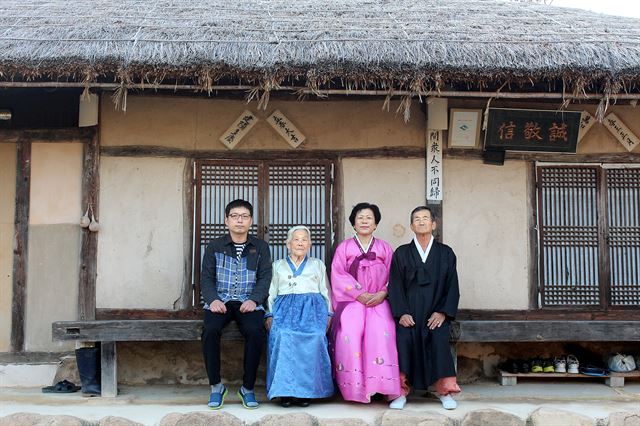
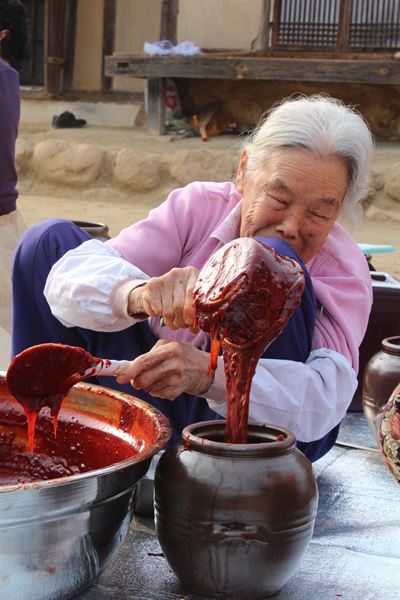
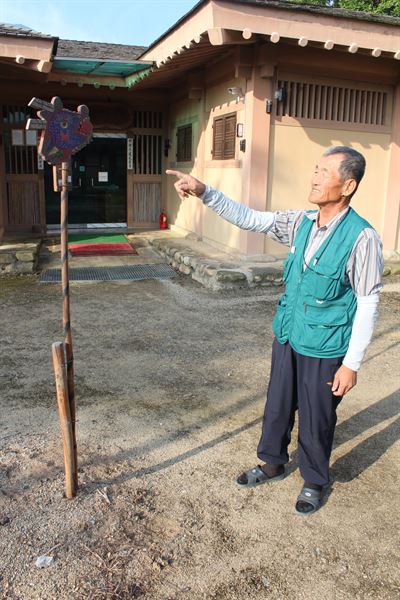
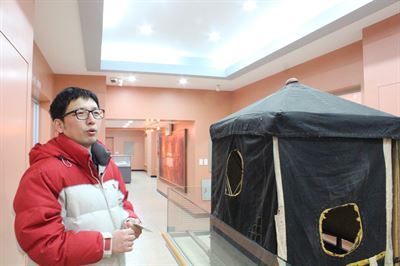
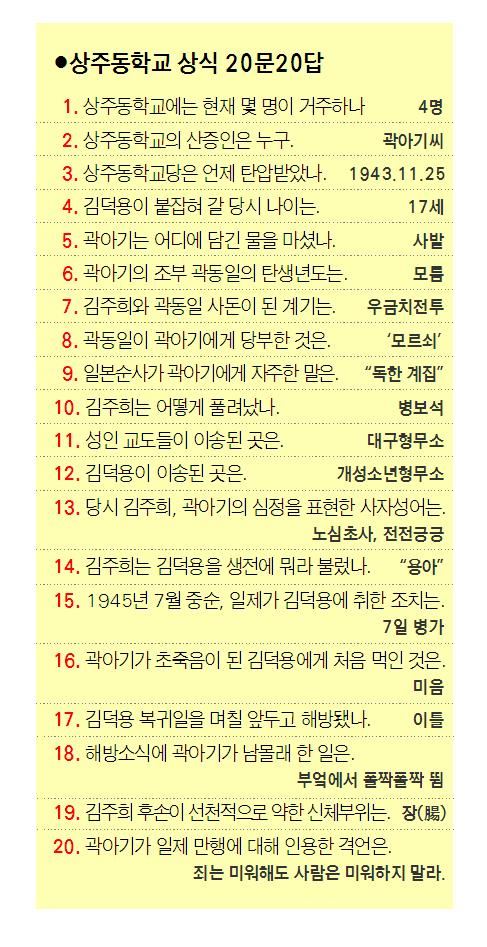
산다는 것은 뭘까. ‘먹고’ 산다는 게 아닐까. 실로 그런 건지 모른다. 먹고 사는 일은 때가 되면 누구나 해야 한다. 하나 먹고 사는 일이 어디 말처럼 쉬운가. 누구나 잘 먹고 잘 살 수는 없는 노릇이다. 죽어라 노력한다고 되는 일도, 정직하게 산다고 되는 것도 아니지 않던가. 하물며 무언가를 지키면서 먹고 살아야 하는 삶은 오죽 힘들까.
상주동학교당에는 교주 김주희의 3대(代)가 거주한다. 며느리 곽아기(89), 손자 김정선(65)ㆍ손부 이점순(57), 증손 김인경(36)씨가 산다. 며느리 곽씨는 열여섯에 시집와 줄곧 살았으니 칠십 평생을 교당에서만 살았다. 그는 상주동학교의 산증인이다. 손자 김씨는 교당에서 나고 자랐다. 상주시 은척면 우기리 주민이었던 손부 이씨는 어른들의 주선으로 스물한 살에 김씨와 결혼해 교당의 새 안주인이 됐다. 김씨와 이씨 사이에서 증손 김씨가 태어났다. 그 역시 교당에서 나고 자랐다. 이들 네 식구의 삶을 가만 반추(反芻)해 보면 ‘또 하나의 일제수난사’가 그려진다. 이 수난사는 해 질 녘 산그늘처럼 현재에도 여전히 침침하게 드리워져 있다.
또 하나의 일제수난사
일제가 기습 진압 작전을 펼친 1943년 11월 25일이 수난의 서막이었다. 상투가 싹둑싹둑 잘려나가는 수모를 겪고 포승줄에 묶여 줄줄이 상주경찰서로 연행된 그날, 곽씨 남편 김덕용(1928~1987)도 붙들려 갔다. 장가를 들어 상투를 틀었지만, 아직은 열일곱 앳된 소년이었다. 남편보다 세 살 연상이었던 곽씨는 애타는 가슴을 진정시키느라 사발에 담긴 찬물만 벌컥벌컥 들이켰다.
할아버지 곽동일(생몰연대 미상)도 곽씨에게 이런 상황에 대한 언질은 주지 않았다. 곽동일은 충북 영동 유지로 일찍이 동학에 입도한 것으로 알려졌다. 우금치전투 때 김주희를 도운 인연으로 사돈을 맺었다. 곽동일은 손녀 곽씨에게 평소 말을 아끼고, 혹여 순사가 동학과 시아버지 김주희에 대해 묻거든 무조건 모르쇠로 일관할 것을 당부했다고 한다. 곽씨는 그것을 금언처럼 따랐다. 그 사달이 나기 전, 수시로 교당에 드나들며 곽씨를 상대로 탐문을 벌인 순사들은 혀를 내둘렀다. 곽씨에게 무엇을 물어도 ‘모른다’고만 하니, 몽니 부리듯 “어린 계집이 참 독하다”는 말만 내뱉고 뒤돌아서곤 했다. 그런 곽씨에게 그날은 짧은 생애 가장 암담한 날이었다.
이듬해 봄, 다행히 시아버지 김주희는 병보석으로 무사 귀환했다. 하나 부주교 김낙세를 비롯해 성인 교도들은 대구형무소로 이송됐다는 소식이 들려왔다. 미성년자였던 김덕용은 저 북쪽 개성소년형무소로 넘겨졌다는 소식과 함께. 불길한 징조였다. 지척에 김천소년형무소도 있건만 왜 하필 멀고 먼 개성이란 말인가. 곽씨와 시어머니 하회 류씨는 전전긍긍했다. 김주희도 대놓고 내색은 않았지만 노심초사하는 기색이 역력했다. 그럴 만도 했다.
김주희에게 김덕용은 하늘이 준 선물이나 진배없었다. 그의 나이 예순여덟에 얻은 첫 아들이었다. 김덕용이 고추를 갖고 나자 교도들이 ‘큰일 하셨다’며 제 일처럼 기뻐하던 일이 주마등처럼 김주희의 뇌리를 스쳐 지나갔다. 이미 연로했던 김주희는 노환과 마음의 병이 겹쳐 앓아누웠다. 근심걱정은 악몽으로 이어졌다. 아들 덕용이 모진 고문을 받는 꿈이었다. 생각만으로도 식은땀이 등골에 고랑을 내는 듯했다. 곽씨는 “시아버지께서 남편을 얼마나 금이야 옥이야 여기셨는지 모른다”며 “그런 아들을 감옥에 보내놓고 꿈속에서도 ‘용아, 용아’를 애타게 찾으셨다”고 했다.
하지만 하늘은 김주희에게 두 번째 선물은 내어주지 않았다. 부주교 김낙세가 고문으로 옥중 사망했다는 소식을 듣고, 그 충격으로 김낙세 뒤를 따라갔다. 그리고 김주희의 악몽은 불행하게도 현실로 나타났다. 남편 소식을 생판 모르고 지내던 곽씨는 1945년 7월 중순, 개성소년형무소가 보낸 전보 한 통을 받는다. ‘김덕용을 특별히 일주일간 일시귀가 조치할 테니, 데려가 몸을 추스린 뒤 다시 돌려보내’란 내용이었다. 더없이 반가운 일이었지만, 생전 듣도 보도 못한 ‘형무소 병가(病暇)’여서 불길한 마음을 떨쳐버릴 수 없었다. 곽씨는 집안 장정을 보내 남편을 데려왔다. 이 몹쓸 여성의 감이란!
곽씨는 오열했다. 만신창이가 돼 가마에 실려 온 남편은 생사조차 가늠하기 힘든 상태였다. 남편의 코에 가만 볼을 가져다 댔더니 얕은 숨이 새어나왔다. 머리칼은 제멋대로 헝클어져 있었지만, 무명옷은 새 옷 같게 깔끔했다. 곽씨는 “남편을 방에 눕혀 놓고 미음을 떠먹이다 가만 생각하니 이대로 초상 치르라고 새 옷을 입혀놨나 싶어 부아가 치밀었다”며 “반드시 살려내는 게 일본 놈들한테 복수하는 거라고 생각했다”고 했다. 그러면서 곽씨는 일본 놈들이 빨리 망해 물러가기를 치성(致誠)으로 기도했다고 한다.
하늘이 용케도 곽씨의 소원을 들어주었다. 아니, 곽씨는 시아버지가 소원을 들어주었다고 믿고 있었다. 개성소년형무소가 통보한 복귀일을 이틀 앞두고 거짓말 같은 일이 벌어졌다. 진짜 일제가 패망해 물러가고 거리 곳곳이 태극기로 펄럭였다. 해방이 된 것이다. 곽씨는 “구십 평생 그때처럼 기쁜 날은 없었다”고 했다. 곽씨는 세상을 다 얻은 듯 기뻐하며 부엌에서 남몰래 폴짝폴짝 뛰었다. 다 죽어가는 남편을 도로 일제에 내주지 않아도 된다는 안도감이 해방의 기쁨을 당장에는 뛰어넘은 거였다.
쉰아홉에 생을 마감한 김덕용은 고문 후유증으로 괴로운 여생을 보냈다. 어혈이 온몸에 뭉쳐 침과 뜸을 달고 살았다. 이미 심신이 쇠약해질 대로 쇠약해져 바깥일을 거의 못했다. 그런 남편을 곽씨는 지극정성으로 돌봤다. 4년쯤 지나자 생기를 되찾고 건강을 회복했다. 그러나 이미 탈난 속은 늘 말썽이었다. 곽씨는 “지금 생각하면 육십까지 산 게 용할 정도”라며 “몇 년 못 살고 이대로 가면 어쩌나 싶어 남몰래 눈물 훔친 밤은 헤아리지도 못한다”고 했다.
그 말썽은 대물림된다. 김덕용 스물한 살에 김정선을 얻는다. 김정선은 선천적으로 장(腸)이 약하게 태어났다. 음식을 가려 먹어야 하고, 물이 바뀌면 속이 견디지 못했다. 그래서 외식과 여행은 아예 생각지도 않는다. 그나마 김정선은 아들 인경에 비하면 사정이 낫다. 인경은 근 10년 째 장질환을 앓고 있다. 인경은 건실한 공학도였다. 2005년 대학졸업 직후, 로봇을 만드는 탄탄한 중견기업에 합격했다. 헌데 건강검진 중 이상 징후가 발견됐다. 회사 측은 인경에게 대형병원에서 정밀검진을 받아보기를 권한다. 그때까지만 해도 인경은 별일 있을까 싶었다.
정밀검진 결과가 나왔다. 병원에서는 ‘크론병’이라고 판정했다. 크론병은 난치성질환이다. 회사는 인경을 받아들일 수 없다고 했다. 스물일곱 인경의 삶이 송두리째 흔들린 순간이다. 인경은 “지금은 담담하게 말할 수 있지만, 그 당시에는 충격이 엄청 났었다”고 했다. 그 좋은 재주를 발휘하며 살아갈 수 없는 건 집을 떠나 먹고 자는 일이 대단히 힘들기 때문이다. 그렇다고 집에서 지낸다고 일상생활에 무리가 없는 건 아니다. 그저 누워야 할 때 누울 수 있고, 그나마 음식은 가려먹을 수 있다.
의학계에서는 우리나라 크론병 환자가 4만명 정도로 파악하고 있다. 크론병이 난치성질환으로 분류되는 이유는 원인이 규명되지 않았기 때문이다. 크론병은 만성 염증 장질환으로 병자마다 증상이 각기 다르다. 해서 적절한 식이요법이란 게 있을 수 없다. 서울대학교병원은 포털사이트에 ‘크론병은 회맹부(대장과 소장이 연결되는 부위)에 염증이 나타나는 경우가 40~60%로 가장 흔하고, 소장에만 염증이 생기는 경우가 30%, 대장에만 발병하는 경우가 10~25%를 차지한다’고 설명해 놓았다.
인경의 경우 소장에 자주 염증이 생기고, 소화가 잘 안 되는 증세를 보인다. 그러다 심해지면 몸살을 동반한 장염, 급성 인후염 등으로 악화된다. 이 같은 증세가 1년 365일 시시때때로 나타난다고 하니, 그 고충은 두 말할 필요도 없겠다. 인경은 자신의 병을 “전투하는 데 안개가 껴 피아구분이 없이 공격하는 격”이라며 “바이러스가 침투하면 멀쩡한 세포가 자기들끼리 공격해 합병증을 유발한다”고 했다.
인경은 “그동안 용하다는 병원 한의원을 골백번 드나들었고, 혹시나 하는 마음에 민간요법도 써 봤지만 소용없었다”고 했다. 그사이 삿된 마음을 갖고 접근해 오는 사람도 생겨났다. 한번은 어디서 소문을 듣고 찾아왔는지 몸의 균형이 맞지 않아 그렇다며 치유해 주겠다고 공언해 자의반 타의반 몸을 맡겼다가 멀쩡한 뼈를 비틀고 누르는 통에 몸살로 며칠 동안 앓아눕기도 했다. 그렇게 인경은 10년 가까이 고독한 싸움을 벌여오고 있다.
인경은 크론병과는 별개로 이제 몸과 마음이 지쳐간다. 하지만 내색은 하지 않으려고 노력한다. 할머니, 아버지, 어머니에게 걱정을 끼치기 싫어서다. 반대로 할머니, 아버지, 어머니는 인경에게 미안할 뿐이다. 건강한 유전인자(DNA)를 물려주지 못한 죄스러움에 마음이 먹먹해진다. 어머니 이씨는 “아들만 생각하면 마음이 아파 죽겠다”며 “할 수만 있다면, 내 장을 떼 주고 싶다”고 했다. 아버지 김씨는 “난치병은 못 고치는 병이 아니라 고치기 어려운 병이라 포기할 수 없다”며 “고칠 수 있다는 명의(名醫)를 하루라도 빨리 만났으면 좋겠다”고 했다.
3대가 체득한 것
인경의 할머니 곽씨에게 ‘일본 순사 놈들이 원망스럽지 않느냐’고 물었더니, “죄는 미워해도 사람은 미워해선 안 된다”고 했다. 또 ‘소원이 뭐냐’고 물었더니, “교당 하는 일 잘되고 아들, 손자 하는 일이 잘되길 바란다”고 원론적인 답변을 내놨다. 인경의 아버지 김씨에게 ‘교당 지키는 데 어려운 점이 뭐냐’고 물었더니, “주거공간인 교당에 손님이 끊이지 않아 개인 용무를 제때 못 보는 게 애로”라고 했다. 인경의 어머니 이씨에게 ‘교당 안주인으로 기억에 남는 일이 뭐냐’고 물었더니, “몇 가지 집어서 말하려니 생각이 안 난다”며 씩 웃어 보였다.
고고학자 리처드 리키는 ‘인류의 기원’에서 “유인원이 사람으로 진화된 사건들은 인류가 지구의 주인공으로 등장하는 거대한 드라마로 낭만적으로 묘사되고 있다”며 “그러나 진실은 훨씬 무미건조한 것”라고 썼다. 상주동학교당 3대의 무미건조한 답변이야말로 그대로가 진실이 아닐까. 무언가를 지키면서 산다는 것은 대단한 노고와 희생을 필요로 하지만, 그것이 과거지사가 되면 그 일들은 한낱 ‘옛일’에 지나지 않는 것도 당연한 이치일는지도 모른다. 하나 우리네 삶의 결은 오롯이 현재의 것이기도 하지만, 과거의 것이기도 하고, 미래의 것이기도 하다. 그 결이 비록 아름답지만은 않더라도 우리는 마땅히 지킬 건 지켜가며 살아야 한다. 상주동학교 3대는 우리에게 몸소 그걸 알려주고 있다. 인경이 아픈 것은 아픈 데로 안타까운 것이고, 유물을 지킬 의무는 그 의무대로 보람된 것이고. 우리네 삶은 본디 그렇게 모순적이고도 복잡다단한 굴레 속에서 연속된다는 것을, 그들은 가족 수난사를 통해 능히 체득한 듯하다.
심지훈 한국콘텐츠연구원 총괄에디터
題字: 혜정 류영희
The Story of Sangju Donghak (the Frontier Donghak) (6)
-Three Generations of Sangju Donghak
What is life? Does it mean eating and sleeping? While on earth, everybody has to eat and sleep. However, it is not so easy to make a living. Obviously, all are not blessed to lead happy and wealthy lives. More often than not, blood, sweat and tears do not guarantee a decent living. What would life be like if one put heart and soul into the pursuit of spiritual riches with an air of perfect nonchalance about the material world?
Four people, representing three generations of the Kim family, are presently living at the Sangju Donghak School compound. They are the Leader Kim Joo-hee’s daughter-in-law Gwak Ah-gi (89), his grandson Kim Jung-sun (65) and granddaughter-in-law Lee Jum-soon (57), and his great grandson Kim In-gyeong (36).
The Leader’s daughter-in-law Gwak Ah-gi has lived at the school for more than 70 years, since she married the son of the Leader at the age of sixteen. She is an eyewitness to the School’s history. Her son Kim Jung-sun (65) was born at the School and grew up there.
The son married Lee Jum-soon from Woogi-ri, Eunjuk-myon, Sangju through the good offices of a faithful Donghak follower. The twenty-one-year-old bride became the new lady of the house. The great grandson, Kim In-gyeong (36), was born to the couple and grew up there at the compound. The life of the family has run parallel to the tumultuous history of Sangju Donghak. The shadows of the hardships are still cast upon the family and the school like mountains before the setting sun.
Another Mop-up Operation by the Japanese
November 25, 1943 was the first day of their distress, when the Japanese started a mop-up operation aimed at Sangju Donghak. On the very day when the top-hair-knots were cut off and the followers of the school were carried way, Kim Duk-yong (1928-87), Gwak Ah-gi’s husband, was also taken to Sangju Police Station. Kim was only seventeen years old at the time, but he wore a top-hair-knot as a married man. Mrs. Gwak, three years older than her husband, could do nothing but to gulp down bowls of cold water to calm herself down.
It was an unexpected event for her, as her grandfather, Gwak Dong-il, had never told her that such a thing was possible. An influential person in Youngdong area, Gwak Dong-il became a Donghak member in the early years of the movement. The Leader Kim and Gwak later became relatives by marriage, and the two became closely bound up with each other at the Woogeumchi Battle in 1894. Gwak helped Kim in many ways. The two seemed to have shared the same views on the national situation and spiritual affairs. Mrs. Gwak remembers that her grandfather advised her to take a cautious attitude, especially with the Japanese, and even if subjected to a severe cross-examination, to use her right to remain silent. Mrs. Gwak faithfully kept her promise to her grandfather and never said anything about the School and her father-in-law to the Japanese. When they found that they couldn’t get anything out of her, they spat out a gross insult, “You are an awful mute!” Having experienced many insults and afflictions, Mrs. Gwak couldn’t bear the sorrows on the darkest days of the crackdown.
The next spring, her father-in-law was given compassionate release, but she had an ominous feeling when her husband was sent to a boy prison in the faraway city of Gaesung, while other adult Donghak followers including Kim Nak-sae, the Deputy Leader, were transferred to Daegu Penitentiary. She heard her husband, Kim Deok-yong, was sent there for being a minor. All her immediate family, including the Leader Kim Joo-hee, Mrs Yoo, her mother-in-law, and herself were deeply worried about this unexpected change in prisons. The Leader Kim didn’t show his anxiety on his face, but he was troubled by his son’s maltreatment. He knew why they sent his son far away, separate from the other followers.
Kim Duk-yong held a special place in Kim Joo-hee’s heart, as he and his wife were unable to conceive until Kim was 68. He fell sick in bed from the combined stress of his old age and this mishap. He suffered from nightmares of his son’s torture mixed with happy memories of his birth. Mrs. Gwak said in reminiscence, “My father-in-law loved my husband so much. My husband was literally the apple of his eye. With his beloved son in police custody, he couldn’t sleep well, calling his name in a delirious fever.”
But the deplorable events didn’t end there. Deputy Leader Kim Nak-sae died on the rack. Soon after, the Leader himself followed his spiritual comrade. Mrs. Gwak’s gloomy premonition became reality. She received a telegraph from the prison in Gaeseong, reading ‘Kim Duk-yong, has been granted special leave for a week. Return him to the prison after recovery.’ She was relieved to hear about her husband, but felt worried because she had never heard of ‘a sick leave’ at that time. She managed to bring her husband home and was not surprised to find her feminine instincts proven correct.
Mrs. Gwak wept bitterly over her husband’s condition. Covered all over with wounds, the young man seemed to be dead. She put her ear to his nose and felt a feeble breath coming out. His hair was unkempt, but he was in a clean cotton clothes. While trying to feed him some fluids, Mrs. Gwak thought the Japanese people must have dressed him in the clean white clothes as some sort of cruel mockery of a burial shroud. Thinking of their sarcastic intention, she flushed with anger and decided to save her husband by any means necessary. She thought it was the only way to avenge the wrongs done to her family. From that moment she began to pray to Heaven with all her heart for her husband’s recovery and the enemy’s defeat.
Heaven must have heard her prayers. Mrs. Gwak believes her father-in-law heard her wishes. The day before he was ordered to return to prison, something miraculous happened. Japan surrendered to the Allies unconditionally. The waves of Tae-geuk-ki, the Korean National flag, covered all over the country.
The young lady secretly jumped for joy, perhaps more out of relief that she could keep her husband beside her than gratitude for the country’s liberation.
Mrs. Gwak took care of her husband with utter devotion until he slowly began to recover. He still couldn’t do any household chores, much less hard farm work. Until he died at the age of 59, he had to be administered with acupuncture and other traditional Korean remedies to help maintain his shattered body. Mrs. Gwak says, “I think it was a miracle that he lived to be 59 with such a severely damaged mind and body. I can’t remember how many nights I spent crying, thinking that he would go away with no hope of recovering.”
The Grandson suffers from an incurable “Crohn’s Disease”
For unknown reasons, Kim’s physical sufferings was handed down to future generations. Kim Duk-yong fathered a son at the age of 21. The son, Jung-sun, was born with intestinal trouble. He had to be careful about what he put in his body. Accordingly, he couldn’t travel freely. Still he is better than his son, In-gyeong. The young man has long been suffering from an incurable disease.
In-gyeong studied engineering at college and passed a job-test at a prosperous robot manufacturing company in 2005. But a subsequent physical examination revealed that he had something wrong with his intestines. The company advised him to take a more in-depth examination.
The specialists diagnosed him with Crohn’s disease, which has no cure. The company decided not to hire him.
That was the moment when the young man’s life began to become unraveled. He was the first member of the family that tried to leave the School and join mainstream society. He confesses, “Frankly speaking, I was shocked at the diagnosis.”
His fragile health hasn’t allowed him to travel freely; most of the time he has stayed in the compound, brooding over what might have been.
The medical circles report that approximately 40,000 Crohn’s sufferers have been found in the country. The illness is classified as incurable because there is not yet a successful treatment regiment. The cause of this chronic intestinal inflammation, according to Seoul National University Hospital, is unknown. It has been found that roughly 40-60% of cases appear in the connecting region between the small intestine and the colon, 30% in the small intestine and 10-20% in the colon. In the case of In-Gyeong, the trouble resides in the small intestine, causing serious digestive issues. It is often complicated by enteritis and a feverish sore throat. Attacks occur with no prior symptoms at any time. In-gyeong says, “It is just like a hand-to-hand fight in the dense fog in which one is unable to tell friend from foe. When triggered by some unknown viruses, the healthy cells begin to attack each other, causing uncontrollable complications.”
In the past decade, he has visited countless hospitals and been treated with countless medications. Unfortunately, nothing has proven effective. He has even attempted to try traditional medicine. Finally, he couldn’t ignore his older relatives who recommended he meet some ‘doubtful horse doctors.’ They only left him with more pain. One of them tried to treat him by twisting his ‘unbalanced body,’ leaving him with nearly broken bones.
In-gyeong’s lonely fight is still going on, but he tries never to show his agony. He knows it is the one way he can lighten the burden on his beloved family, his grandmother and parents.
The rest of the family feels guilty about the illness In-gyeong suffers from. They think the trouble was inherited from them. Mrs. Lee, the mother of In-gyeong, says, “If possible, I would take off my own body parts for my son.” His father lays his hope on the development of new medicine that will cure his son’s chronic trouble. ”The words “hard to treat” do not mean ‘impossible to treat.’ I believe that science will make this possible. I do hope to meet a good doctor as soon as possible.“
The Lessons of the Three Generations
When asked if she hates the Japanese Police who caused all these afflictions, Mrs. Gwak Ah-gi answered, “I hate the sins but not the men.” Asked again what her wishes were at present, she said in quiet tones, “The works of the School and those of my son and grandson will go as well as Heaven intends.” She maintains a positive attitude towards the School and her personal faith.
Asked about the present situation of the School, the father gave a down-to-earth answer, “Parts of the School building are used as our private living space. My family is personally inconvenienced by the constant stream of visitors.”
And his wife, Mrs. Lee, answered a question about her life as the hostess, “Nothing special to say about the life here. I have tried to learn and put into practice what I have learned from my mother-in-law.”
In his book The Origin of Humankind, Archeologist Richard Leakey said that the evolution of man from an ape-man has grandiosely, romantically been depicted as the appearance of the hero of the Earth, but actually, the process was far more ‘dry and dreary.’
Likewise, the answers given by the three generations of the family might sound plain and simple, but their candid words remind one that the face of the truth doesn’t need cosmetics. To live to keep something meaningful requires a lot of sacrifice and effort, and the past is apt to be easily forgotten. What we should not forget is that the present is the result of the past and at the same time part of the future. Though time may not flow as smoothly as we might wish, we cannot discard it. Rather, we are destined to improve it.
The three generations of Kims stand witness to the history of Sangju Donghak: the illness of In-gyeong itself is deplorable, but to maintain the tradition is inherently valuable. Through all these trials and tribulations, the Kims have maintained their patient vigil over the legacy of Sangju Donghak, just as their ancestors have done before them.
Written by Sim, Ji-hoon, Editor in Chief of Hangook Contents Institute
The Inscription by Haejong Yoo, Young-hee.
Translated by Kim, Heedal & Hwang, Yongsoo (Ph.D) at LIKE TEST PREP (www.likestudy.co.kr)
기사 URL이 복사되었습니다.

댓글0